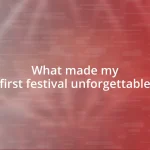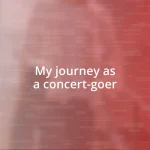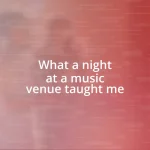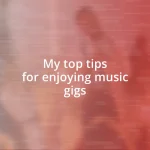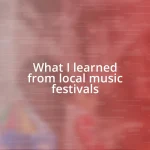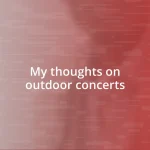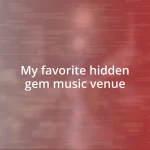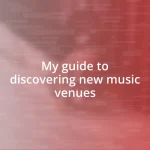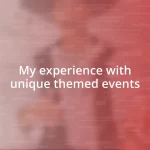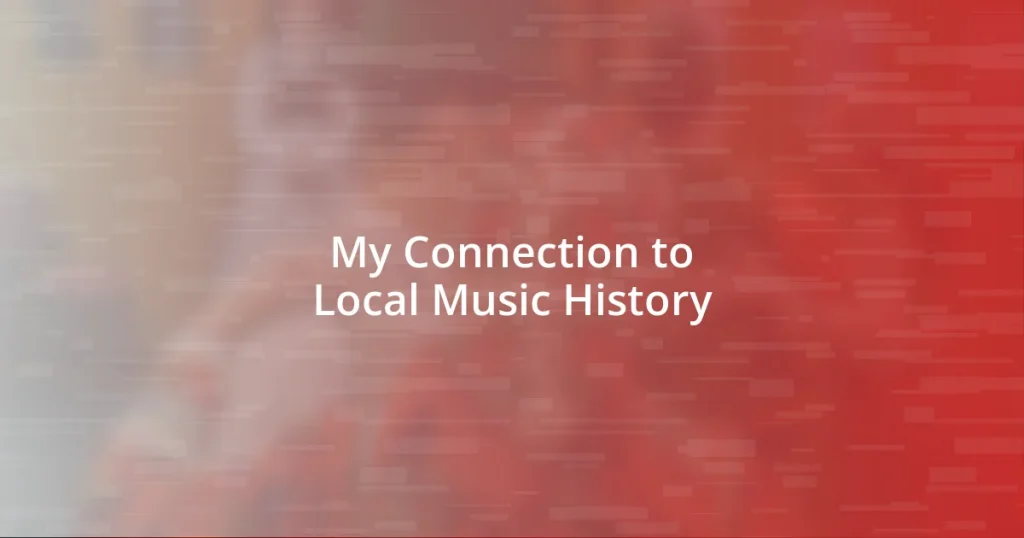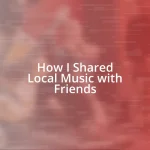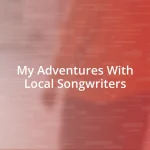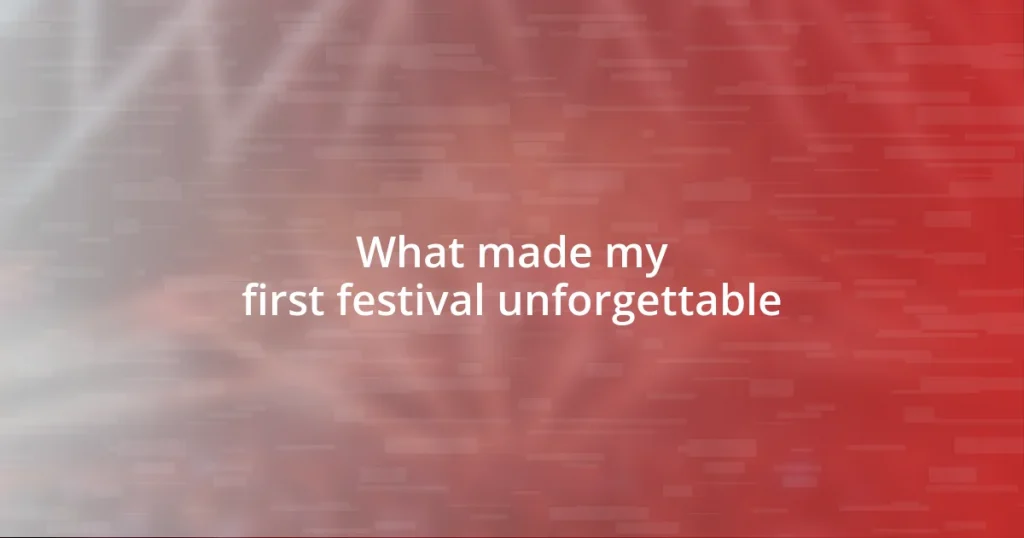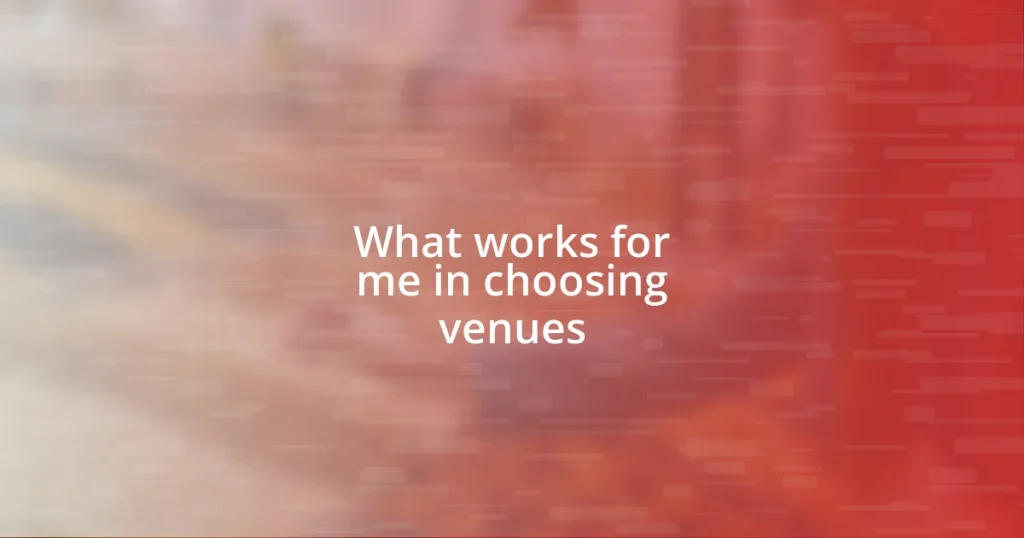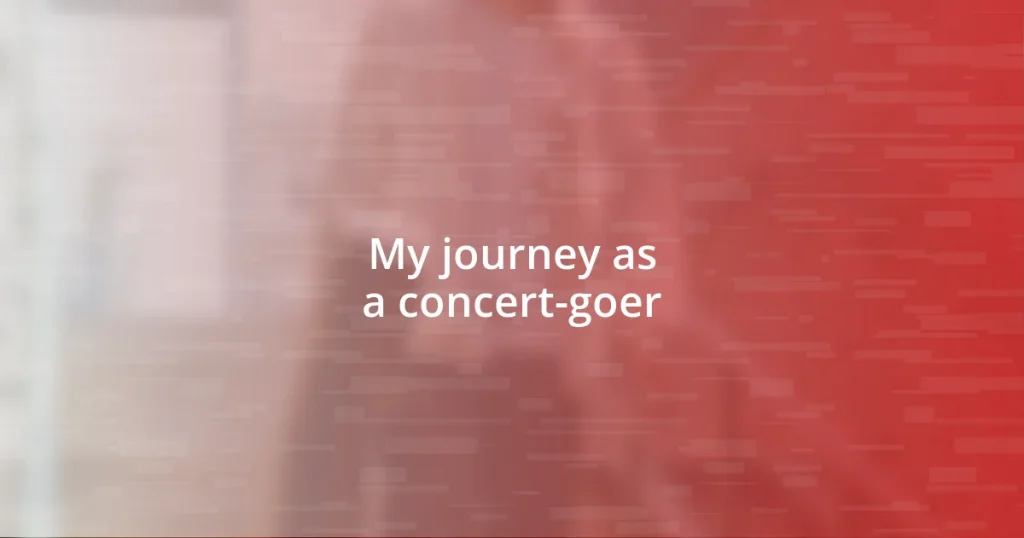Key takeaways:
- Understanding local music history reveals the resilience of artists and the evolution of genres, highlighting the emotional connections woven into community narratives.
- Significant venues and music festivals play crucial roles in fostering community engagement, showcasing talent, and boosting local economies through shared experiences.
- The future of the local music scene is promising, driven by emerging artists, technology’s reach, and innovative genre fusions that enhance the cultural landscape.
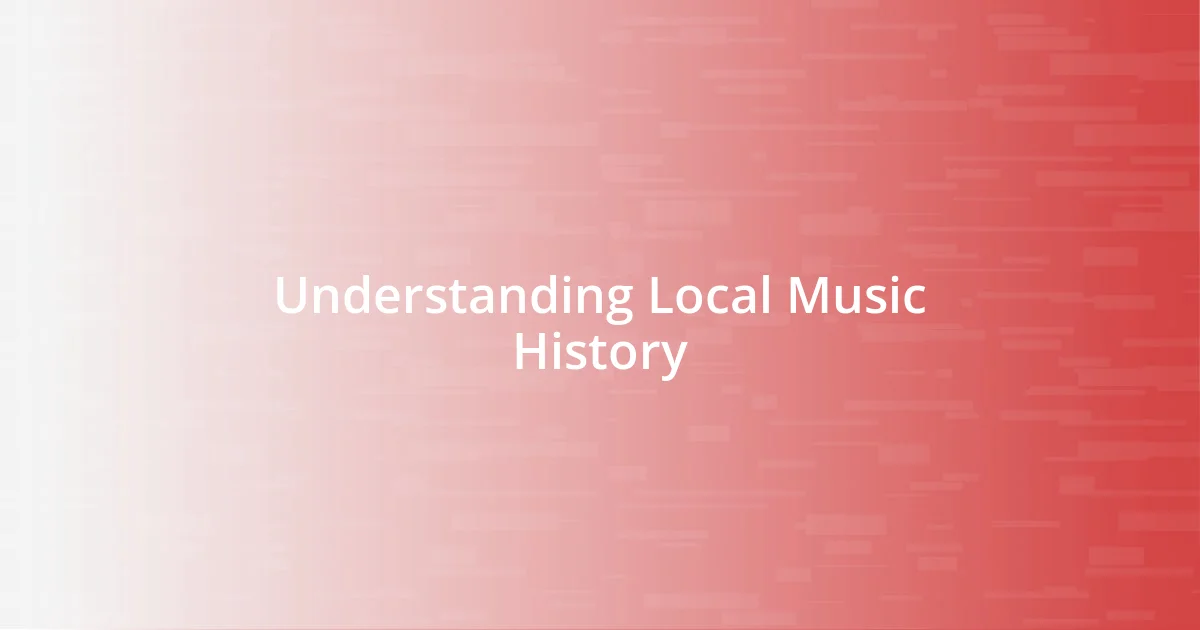
Understanding Local Music History
Understanding the roots of local music history is a journey filled with rich narratives and vibrant characters. I remember my first visit to a small record store tucked away on a quiet street. The owner, an elderly gentleman with a passion for vinyl, shared stories of local bands that played in backyards and coffeehouses, creating a community that thrived on creativity. Isn’t it fascinating how music can weave together the fabric of our neighborhoods?
As I delved deeper into the history, I was struck by the sheer resilience of local artists. For instance, think about how many times bands have faced challenges, from lack of funding to limited venue access. I once met a singer-songwriter who had opened for some famous acts but struggled to find a platform in her own town. Her desire to connect with her community through music left a profound impact on me, highlighting the importance of providing local talent a voice. How often do we overlook these stories and the legacy they leave behind?
When reflecting on local music history, it’s essential to consider how different genres have influenced one another over generations. I often find myself imagining how the blues from decades ago traveled through the hands of artists, evolving into rock and then branching into various sub-genres. This evolution isn’t just about music; it’s about expressing emotions and experiences that resonate with so many. What tracks from your area’s past still echo today, shaping the sound of your local scene?
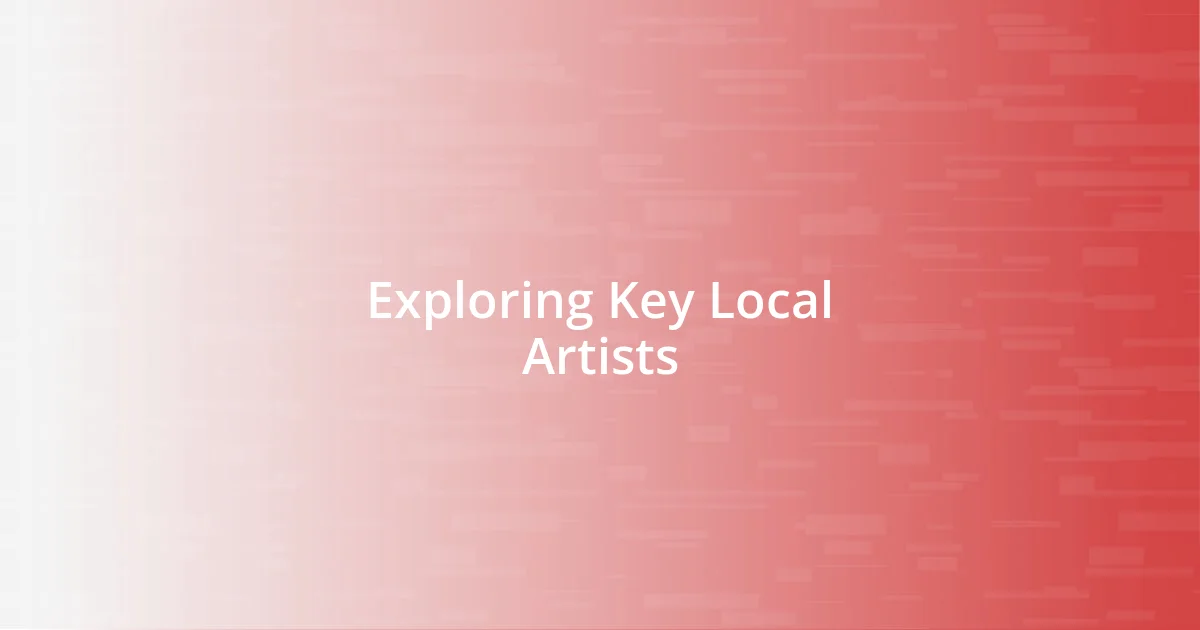
Exploring Key Local Artists
As I explored the local music scene, I stumbled upon a legendary band that truly embodies our community’s spirit. Their garage rock sound was infused with social commentary, and it reminded me of the time I attended one of their outdoor shows. The energy was electric, with friends and families gathering, laughing, and dancing under the open sky. It’s moments like these that illustrate how collective experiences can spark a sense of unity through music. Can you recall a time when a local concert transformed your perception of music in your community?
Another artist who has made waves is a folk musician known for her hauntingly beautiful ballads. I remember hearing her perform at a small café during an open mic night, her voice resonating with the stories of the people around her. It left me in awe how her lyrics captured the essence of our city’s struggles and triumphs. This connection to local narratives is crucial as it allows artists to reflect and amplify the shared experiences of their audience, crafting a musical tapestry that feels deeply personal yet universally relatable.
No discussion of our local music scene would be complete without mentioning the vibrant hip-hop artists who are rising to prominence. I’ve witnessed how their beats and rhymes tell powerful stories of resilience and aspiration. A talented young rapper once shared his journey of overcoming adversity through his music at a community event, and I felt every word resonate. This genre truly gives a voice to the voiceless, transforming pain into art. How does seeing your community represented in music resonate with you on a personal level?
| Artist | Genre |
|---|---|
| Legendary Band | Garage Rock |
| Folk Musician | Folk |
| Rising Rapper | Hip-Hop |
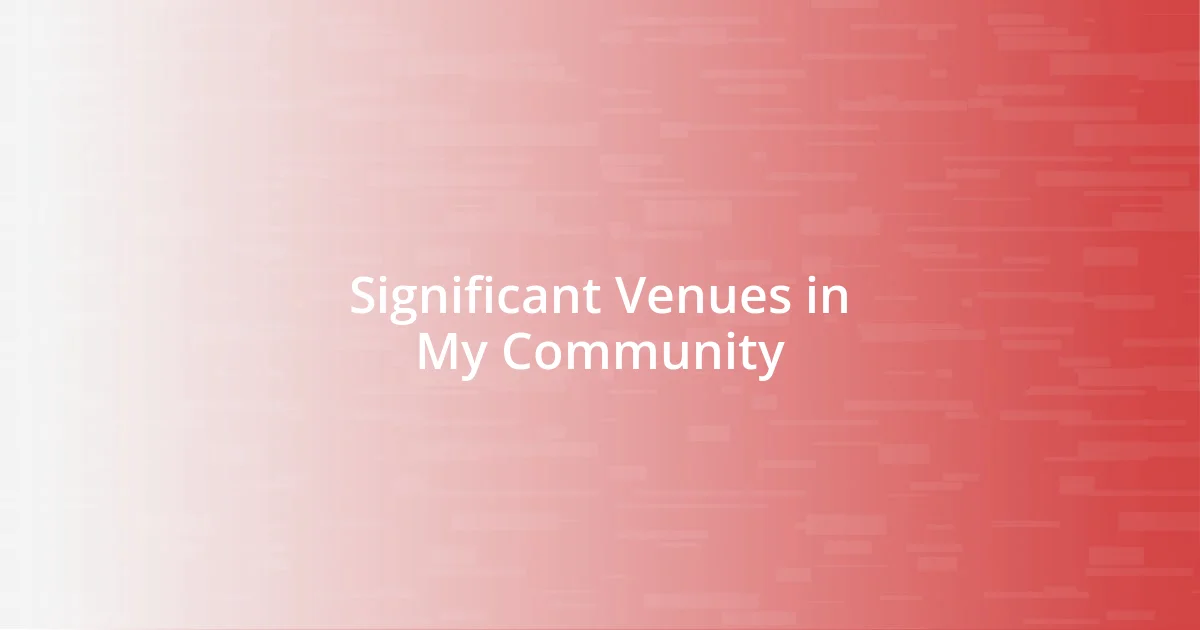
Significant Venues in My Community
The significance of local venues cannot be overstated, as they serve as the heart and soul of our music community. I fondly recall my first experience at the community theater, where I saw an up-and-coming band perform. The intimate atmosphere allowed the crowd to connect with the musicians on a personal level, almost like we were sharing a secret. It’s within these walls that discoveries happen; even the most reserved audience members can’t help but sway to the beat.
- The community theater: A hub for diverse performances and emerging talent.
- The old pub: Known for its open mic nights, where local artists showcase their skills.
- The outdoor park: Hosting summer music festivals that draw families and friends together.
- The historic club: A place where legendary local acts have made their mark, etching memories in the minds of attendees.
When I think of another significant venue, I can’t help but smile while remembering the local café that became a second home to many artists. I’d often find myself sipping coffee while soaking in the live performances that filled the air with stories and melodies. I vividly recall a rainy evening when a group of musicians spontaneously gathered outside to play, the raindrops harmonizing with their strumming. In moments like these, the café transforms into a sanctuary where everyone feels a sense of belonging.
- The local café: Buzzing with creativity during open mic nights, it fosters community connections.
- The art gallery: Hosting events that blend visual artistry with live music, creating a multi-sensory experience.
- The skate park: An unconventional venue where artists perform, capturing the spirit and energy of youth culture.
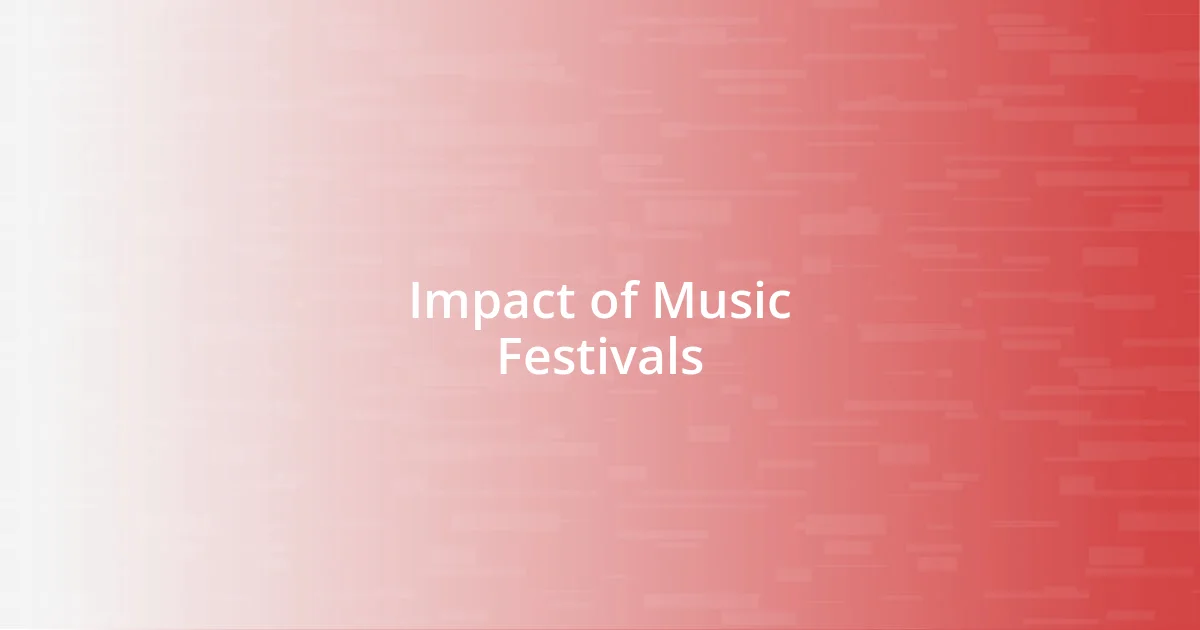
Impact of Music Festivals
Music festivals have a remarkable ability to transform our community through shared experiences. I still remember the first festival I attended in our vibrant town. The diverse lineup of artists spoke to a wide array of tastes, and I could see the joy on people’s faces as they danced and sang along. It’s incredible how such events can bring together different generations and backgrounds, crafting unique memories that linger long after the last song has been played.
I’ve also witnessed how these festivals stimulate local economies. Vendors selling handmade crafts, food trucks offering delicious bites, and small businesses gaining visibility all around the festival grounds. Does it ever amaze you how a celebration of music can inadvertently boost our community’s vibrancy? I once chatted with a local artist at a festival, and she divulged how her little booth helped her connect with new clients, ultimately leading to her biggest sale that summer. The ripple effect of these festivals is often underestimated!
Furthermore, music festivals serve as platforms for emerging artists to shine. I fondly recall watching a young band gain traction after their performance at a local festival. Their humility and talent were palpable, and by the end of the night, they had gained a devoted following. This opportunity can be life-changing for aspiring musicians. Have you ever felt that thrill when discovering a new favorite band live? It’s this kind of connection that these festivals catalyze, creating unforgettable moments and fostering deeper ties within our local music history.
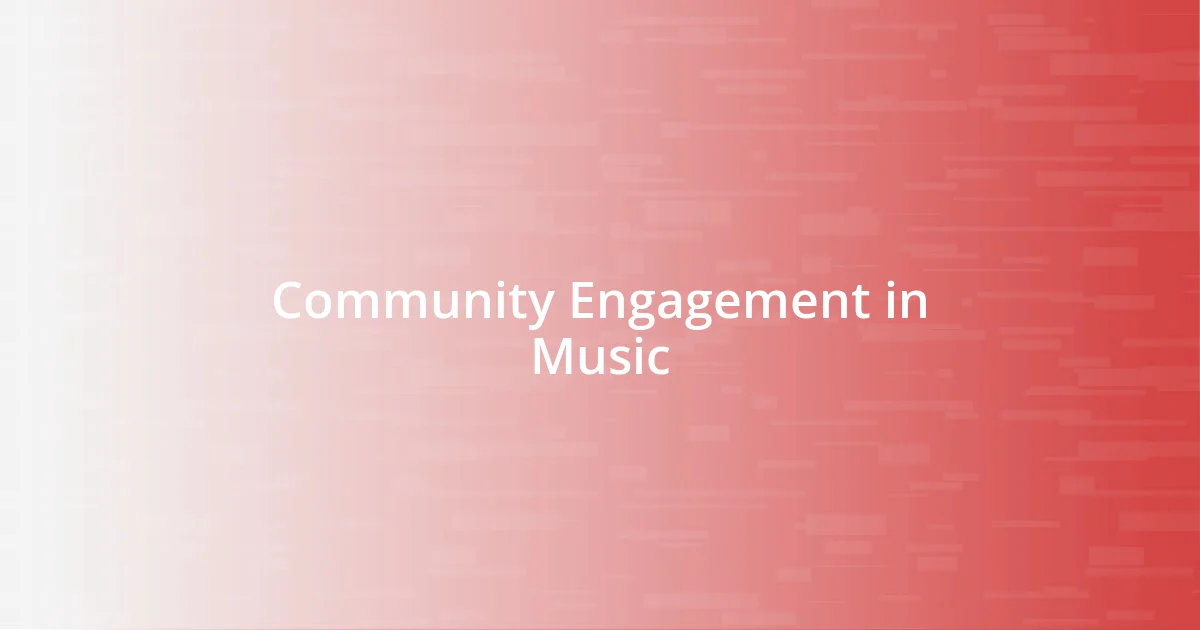
Community Engagement in Music
Community engagement in music often springs from collaboration and shared passions. I recall heading to a local community center for a songwriting workshop. The air buzzed with creativity as musicians of all ages shared their stories and ideas. It’s fascinating how a simple gathering can spark collaborations that lead to beautiful pieces of music, and every note feels like a reflection of our shared experiences.
In my experience, when local artists come together to perform, they create a sense of unity that’s hard to replicate elsewhere. One summer evening, a group of friends and I stumbled upon an impromptu jam session in the park. Musicians were exchanging riffs while an audience formed around them, swaying and singing along. This collective joy highlighted the power of music to bridge gaps and forge connections, proving that we often share more in common than we realize.
I genuinely believe that community-driven music events shape our local identity. I was once part of a neighborhood festival where residents showcased their talents. Watching my neighbor, a quiet graphic designer, step up to the mic and belt out a heartfelt ballad was a revelation. Who knew someone so reserved could possess such a powerful voice? It reminded me that everyone has a story to tell, and music becomes the perfect medium for expression, echoing the diverse tapestry of our community.
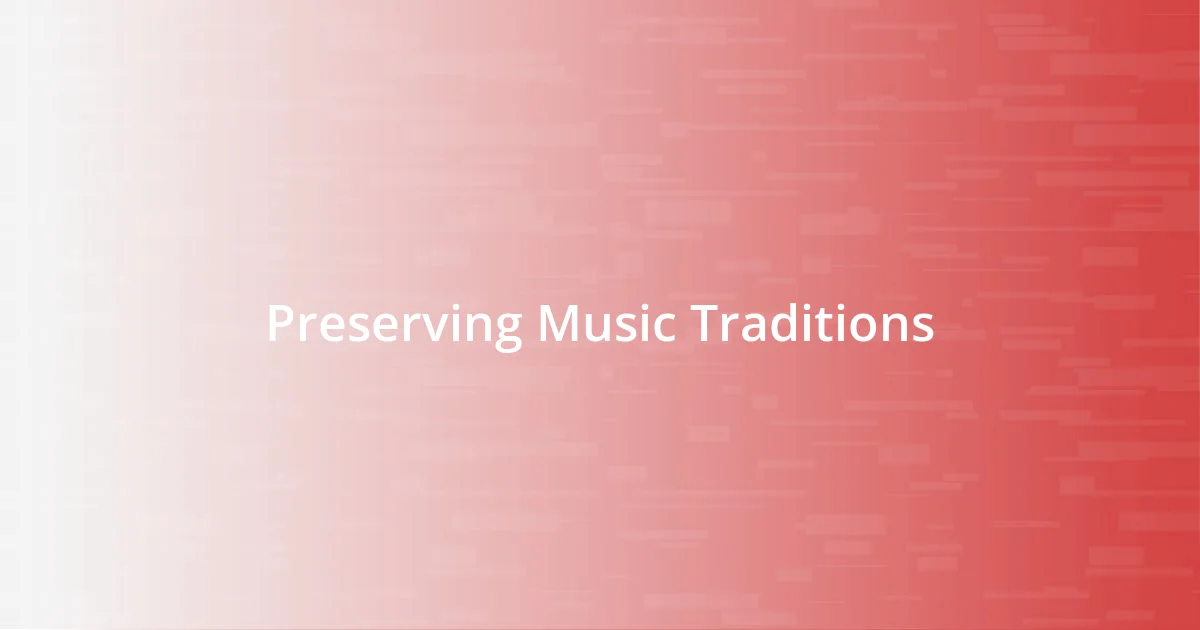
Preserving Music Traditions
Preserving music traditions is vital to maintaining our cultural heritage. I remember visiting an old folk festival where locals proudly showcased traditional instruments and performances passed down through generations. The passion in their voices as they shared the backstories of each song sparked a profound appreciation for the artistry involved. Don’t you love the way these narratives intertwine with the melodies, making each note richer?
I also think about the importance of documenting these traditions in today’s fast-paced world. At a local library, I stumbled upon a collection of recordings from artists who were once the heartbeat of our community’s music scene. Listening to their stories made me realize how essential it is to preserve these sounds for future generations. Have you ever felt a connection with music that transcended time, bringing the past and present together in an unexpected way?
Local initiatives to teach traditional music to younger generations are a heartbeat I cherish. I once attended a workshop where children learned to play an ancient local instrument, their laughter echoing through the hall. It was uplifting to see their enthusiasm, and I couldn’t help but wonder: could this spark a lifelong love for the songs of our ancestors? Preserving music traditions not only honors our history but also cultivates a sense of belonging that resonates deeply within us all.
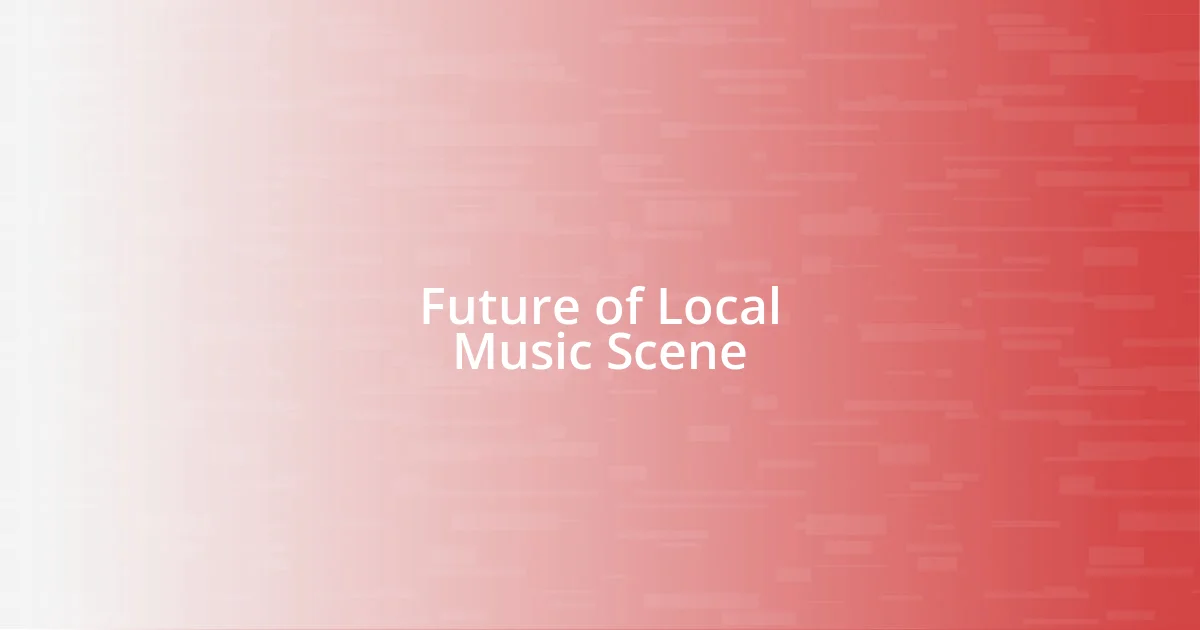
Future of Local Music Scene
The future of our local music scene appears to be brimming with potential, driven by the enthusiasm of emerging artists. I recall attending an open mic night at a cozy cafe, where a shy teenager took the stage. You could feel the crowd’s anticipation as she strummed her guitar and sang her original songs. The raw emotion in her voice resonated deeply with everyone present, reminding me that fresh talent continues to emerge, breathing new life into our musical community.
Technology plays a pivotal role in shaping what lies ahead. I often marvel at how local musicians use social media to connect with audiences far beyond their hometowns. Just the other day, I came across a friend’s band livestreaming a performance. It struck me how this shift not only showcases their artistry but also allows them to engage with fans in real time. Isn’t it incredible how one local event can ripple out into the larger world, broadening the reach of our music?
As boundaries blur between genres, I see a remarkable fusion taking place in local music. I remember attending a collaborative concert that featured a blend of jazz, hip-hop, and folk artists. The energy in the venue was electrifying as musicians switched instruments and styles seamlessly. It left me wondering: how much more innovation can we create by merging our various influences? Embracing this diversity will undoubtedly enrich our soundscape and make the local music scene even more vibrant.
